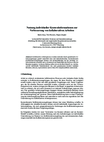Context Modeling for Adaptive Collaboration
Haake, J., Hussein, T., Joop, B., Lukosch, S., Veiel, D., & Ziegler, J. (2009). Abteilung für Informatik und Angewandte Kognitionswissenschaft, Fakultät für Ingenieurwissenschaften, Universität Duisburg-Essen.
Abstract
Collaborative work is characterized by frequently changing situations and corresponding demands for tool support and interaction behavior provided by the collaboration environment. Current approaches to address these changing demands include manual tailoring by end-users and automatic adaptation of single user tools or for individual users. Few systems use context as a basis for adapting collaborative work environments, mostly focusing on document recommendation and awareness provision. In this paper we present, firstly, a generic four layer framework for modeling context in a collaboration environment, secondly, a generic adaptation process translating user activity into state, deriving context for a given focus, and executing adaptation rules on this context, thirdly, a collaboration domain model for describing collaboration environments and collaborative situations, and, fourthly, examples of exploiting our approach to support context-based adaptation in four typical collaboration situations: co-location, co-access, co-recommendation, and co-dependency.



